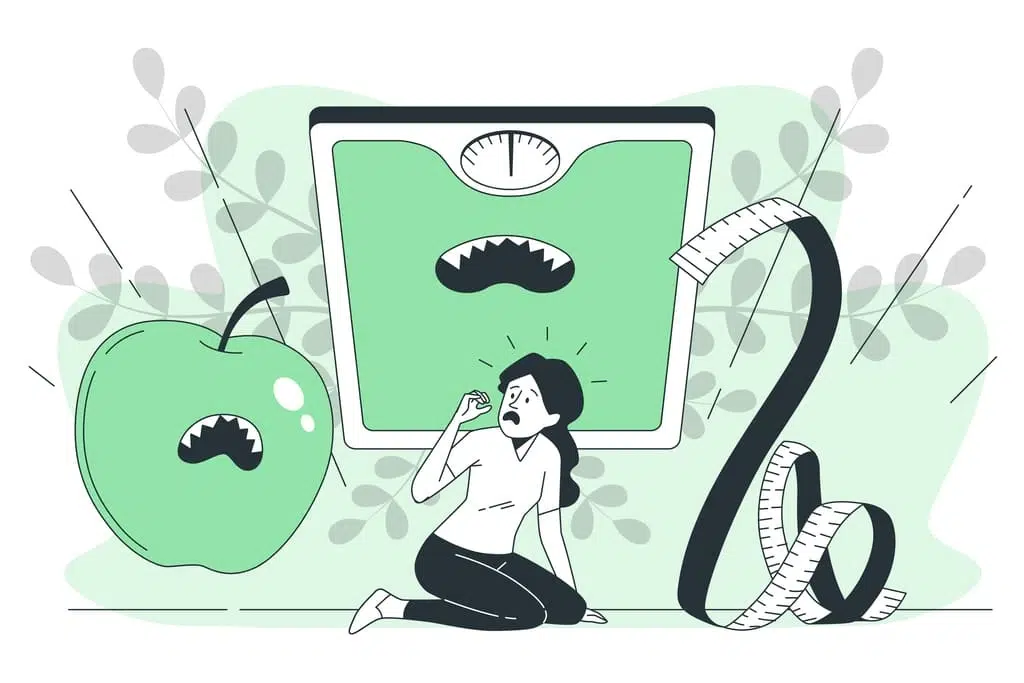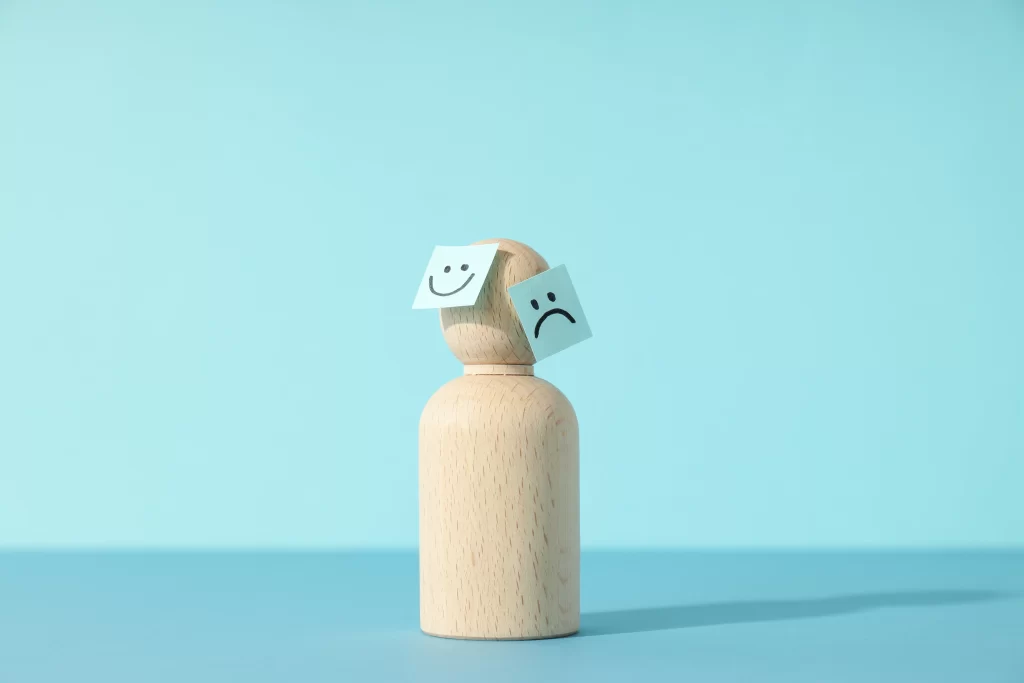What Is Anorexia?
Anorexia is an eating disorder manifested by significant food restriction, distorted body image and unhealthy eating habits. People with anorexia have an intense fear of gaining weight. Many individuals have a low body weight, but having a low body weight is not a measure of anorexia.
Individuals with anorexia have a distorted body image, so what they see in the mirror is a person with extra weight that needs to be reduced. This eating disorder is characterised by a number of unhealthy eating behaviours, including:
- Fear of gaining weight
- Avoiding food at all cost
- Extreme food restriction
- Fasting
- Excessive exercise
- Weighing too often
- Constant dissatisfaction with the body image
- Obsession with weight loss

However, the presence of symptoms of anorexia can vary from person to person, and the precise diagnosis requires evaluation by a medical professional.
Anorexia Physical Characteristics
Anorexia nervosa comes with many emotional and physical signs and symptoms, including physical traits and health challenges.
Common physical characteristics of anorexia include:
- Unhealthy weight loss
- Dry or damaged skin
- Brittle hair and nails
- Brittle hair and nails
- Reduced bone density and osteopenia
- General weakness
- Dizziness and nausea
- Missing periods and infertility
- Problems with the gastrointestinal tract
- Irregular heartbeat
If unrecognised or left untreated, anorexia can have life-threatening consequences to the person’s life.
Anorexia Behaviours
Anorexia behaviours may be difficult to recognise at first. It also might take several months before the physical symptoms become evident. It’s important to be aware of the behaviours of anorexia nervosa to help prevent individuals from worsening or developing an eating disorder.
Common anorexia nervosa behaviours include:
- Skipping meals
- Extreme exercising
- Showing negative self-image
- Eating only low-calorie foods
- Avoiding social events where food is served
- Showing anxiety around eating
- Restlessness, anxiety and depression
- Missing periods and infertility
- Feelings of irritability and agitation
If you or your loved one show some signs of anorexia, it’s important to understand that you are not alone, and there is a way to heal, you just need to ask for help. Our teams at Leaf Complex Care understand the complexity of eating disorders and provide compassionate complex care support and prioritise the comfort and needs of the individual.
What Is Bulimia?
Bulimia nervosa is an eating disorder where people eat large amounts of food, known as binging. Individuals will then purge, which can involve throwing up food, extreme exercise, or taking laxatives to avoid weight gain.
People with bulimia often feel a sense of guilt after eating and tend to eliminate the calories through purging.
Bulimia Physical Characteristics
The most common signs and symptoms of bulimia nervosa include:
- Swollen lymph nodes
- Tooth decay and gum disease
- Dehydration
- Extreme weight fluctuations
- Disturbed stomach and gastrointestinal system
- Absent or irregular menstrual periods
- Anxiety and depression
- Irregular heartbeat
Bulimia Behaviours
People with bulimia nervosa have characteristic behavioural patterns related to food and eating habits, including:
- Constantly worrying about being overweight
- Having an extremely negative body image
- Repeating episodes of binge eating followed by self-induced vomiting
- Purging, fasting or strict dieting after eating large amounts of food
- Avoiding eating in public or in front of other people
- Purging
- Excessive exercising
- Dissatisfaction with body weight
- Frequent visits to the bathroom during or after meals
If you or a loved one are experiencing some of the symptoms of anorexia or bulimia, it’s important to seek help as soon as possible. Additionally, it’s crucial to accept and understand this mental health challenge and provide emotional support and encouragement for the person with an eating disorder.
Anorexia and Bulimia Similarities
Anorexia and bulimia are mental health challenges known as eating disorders. Although they are different mental health challenges, there are specific characteristics that they have in common, including:
- Both bulimia and anorexia are eating disorders resulting from a negative self-image
- People with anorexia and bulimia nervosa often see themselves as overweight, even when they are underweight
- People with anorexia and bulimia have an intense fear of gaining weight and engage in behaviours that prevent weight gain
- People with anorexia and bulimia usually display low self-esteem
- People with both anorexia and bulimia are preoccupied with food and eating and how to reduce their calorie intake
- Both bulimia and anorexia have negative consequences for mental and physical health, which can sometimes be life-threatening
- Both bulimia and anorexia can be effectively treated with psychotherapy, nutritional counselling and specific medications
Key Differences Between Anorexia and Bulimia
Despite all the similarities, there is a significant difference between anorexia and bulimia.
- Anorexia nervosa is an eating disorder which involves significant food restriction
- Bulimia nervosa is an eating disorder which involves a cycle of binging and purging
Both eating disorders are complex, with individuals focused on weight loss.
Mutual Risk Factors of Anorexia and Bulimia
Researchers have identified a range of similarities in understanding the potential mutual risk factors of anorexia and bulimia.
The factors listed below are considered possible causes for the spectrum of eating disorders, including anorexia nervosa, bulimia nervosa, binge eating disorder, and OSFED.
Biological:
- Family history of eating disorders
- Mental health challenges running in the family
- Type 1 Diabetes

Psychological:
- Tendency towards perfectionism
- History of dieting
- Evident dissatisfaction with body weight and image
- History of anxiety or depression
- Behavioural inflexibility
Social:
- Weight stigma and depression
- History of bullying
- History of trauma
- Striving towards unrealistic beauty and body ideals
- Environmental factors
However, it’s important to highlight that not every person with these risk factors will develop anorexia, bulimia or related eating disorders. Also, other factors can lead to developing unhealthy eating habits.
Recovering From Anorexia or Bulimia
Recovering from anorexia or bulimia can be a challenging mental health journey. However, with emotional support and proper care, people with eating disorders can overcome their barriers and live a happy and rewarding life.
The process of recovery occurs gradually and step by step. The treatment includes psychotherapy, nutritional counselling, and medication therapy. It often requires family inclusion and a person-centred care plan.
How to Support a Loved One
Whilst professional help and expert medical advice are essential in treating eating disorders, the most important part of the recovery process is acceptance, understanding and receiving emotional comfort from family, friends and society.
If you have a family member or a peer that is struggling with anorexia or bulimia, here’s what you need to know when providing them with help and support.
Listen Without Judging
Listening to and understanding the intense emotional and mental health challenges of the person is crucial for building a trustworthy relationship and cooperation. Many people associate eating disorders with intentionally unhealthy eating habits and tend to judge instead of understanding the mental health challenge.
At this point, it’s important to highlight that what people with bulimia and anorexia experience is a real, involuntary, and destructive struggle that requires compassion and support.
Be Prepared For Denial, Defensiveness, or Resistance
In most cases, realising the problem and seeking help is the most difficult part of the recovery journey. People with anorexia or bulimia are often unaware of their current state and tend to believe that no one understands what they are going through. Additionally, they are truly dissatisfied with what they see in the mirror and constantly strive for “perfection”.
Therefore, you may have to be prepared for denial and a defensive attitude that covers an intense emotional struggle that needs to be relieved.
Encourage Them To Get Help
Once you gain trust and establish an emotional connection with the person, it’s essential to let them know that they are not alone, and seeking help can significantly improve their quality of life and help them regain control of their life again.
Anorexia and Bulimia Support with Leaf Complex Care
At Leaf Complex Care, we have highly trained teams to provide emotional comfort and mental health support to people with anorexia, bulimia and other eating disorders. We design tailored, person-centred care plans to promote the dignity, respect, and self-confidence of the people we support.
Leaf Complex Care specialises in supporting people with complex care needs of all ages in the comfort of their homes. We provide 24-hour support to short-term and long-term care packages designed to a person’s unique needs and preferences. From personal care and mobility assistance to medication administration and assistance with social activities, we are here to meet all your needs.
With our PBS support, we make every voice matter, every human a person, and every person an active citizen in the community.
We deliver personised care for children and adults with complex care needs in Bristol, Slough, Somerset, and the Midlands. Contact our offices or get in touch here on our website.








